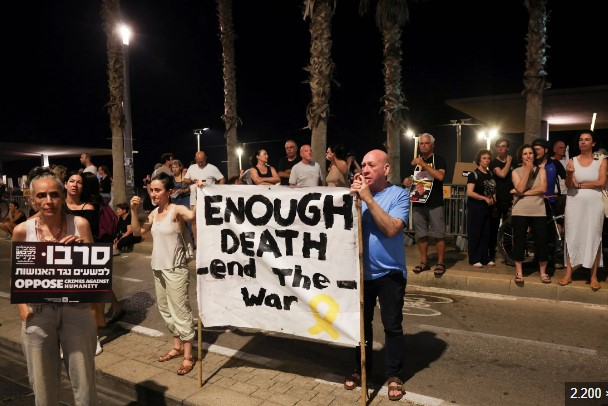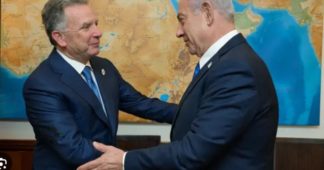Amir TibonHaaretz
Jul 28, 2025
Instead of holding Netanyahu to the terms of the January ceasefire deal, Trump and Witkoff allowed the Israeli prime minister to resume the war, strangle Gaza’s aid supply and trigger a humanitarian catastrophe. All of which failed to bring the hostages home
 Five months ago, in the first week of February, U.S. President Donald Trump issued a surprising ultimatum to Hamas: they must release all Israeli hostages, or Israel should “let all hell break out.”
Five months ago, in the first week of February, U.S. President Donald Trump issued a surprising ultimatum to Hamas: they must release all Israeli hostages, or Israel should “let all hell break out.”
As of mid-2025, 26 Israeli citizens and five Thai citizens have been released. Yet five months after Trump’s threat, 50 hostages remain in captivity in Gaza. Of these, 20 are believed to be alive, while 30 are presumed dead. All could have been returned to their families long ago if Israel had followed through on phase two of the Gaza ceasefire agreement signed in January 2025.
Under this deal, brokered by U.S. Middle East envoy, Steve Witkoff, Hamas was to release all remaining hostages at once, while Israel would withdraw its forces from Gaza and officially end the war.
But instead of adhering to the terms, Israeli Prime Minister Benjamin Netanyahu chose to break it. Then, with support from Trump and Witkoff, he imposed new conditions of surrender on Hamas. Rather than trading all hostages for a permanent ceasefire, Netanyahu introduced a new plan: release some hostages in exchange for a temporary ceasefire, after which Israel could renew its war in Gaza. Hamas rejected this and insisted on fulfilling Witkoff’s previous, signed outline.
This breakdown led to Netanyahu’s decision in mid-March to restart the war in Gaza. More importantly, he also imposed a total blockade on humanitarian aid entering the enclave. For more than two months, as fighting escalated, Israel permitted no food, medicine, or other essential supplies into Gaza. This was the “hell” Trump had promised – an intensified war zone with severe shortages, with no relief for the wretched local population.
The idea behind this strategy? The war-and-blockade combo will bring Hamas to a breaking point, and possibly provoke a civilian uprising against the terror group. This, Netanyahu insisted, will lead Hamas to agree to accept his revised terms, which he rebranded as “The Witkoff Plan,” despite it being a creation of his own inner circle, especially his close aide Ron Dermer.
After two months of a total blockade, as pressure mounted for Israel to allow food, medicine and other supplies into Gaza, Netanyahu pulled a new rabbit out of his hat: The Gaza Humanitarian Foundation. The GHF, established by the U.S., Israel and evangelical Christian groups, was given exclusive control over several aid distribution points in southern Gaza. Its stated goal was to avert a humanitarian catastrophe.
GHF’s disastrous impact
GHF’s arrival was celebrated by the Israeli politicians most associated with plans to concentrate the Gazan population in a small part of the Strip and from there, expel them. Finance Minister Bezalel Smotrich, a key proponent of the plan, called GHF’s entry “the turning point in the war that will lead to victory.”
In July, Reuters reported that a proposal linked to GHF outlined plans to build large “Humanitarian Transit Areas” inside – and possibly outside – Gaza, aiming to replace Hamas’ control and offer sites where Palestinians could “temporarily reside, deradicalize, re-integrate, and prepare to relocate if they wish.” GHF has vehemently denied involvement in such a plan, and insists it has delivered “50 million meals and counting” despite what it calls “doctored images, fake news, and outright lies” – many of which, it claims, originate with Hamas.
Whatever its intentions, GHF’s impact has been disastrous. Gaza is on the brink of mass starvation, and Palestinians are being killed almost daily near distribution centers.
Amid growing global backlash, two significant developments occurred. First, after weeks of global condemnation, the Netanyahu government – facing a mounting backlash – made an embarrassing about-face on Saturday, agreeing to allow significantly more humanitarian aid into Gaza. This included, for the first time during the war, the use of Israeli aircraft to deliver airdrops.
Second, Hamas, recognizing that Netanyahu’s blockade and starvation strategy had become a PR disaster for Israel, raised its demands in the ongoing hostage negotiations. The group began insisting on the release of more Palestinian prisoners per Israeli hostage than in the two previous deals it had struck with Israel since October 7.
Together, these developments highlight a broader reality: Netanyahu dragged Trump and Witkoff into adopting a failed policy – one that returned no living hostages, cost the lives of nearly 50 Israeli soldiers since the war was resumed in March, led to the deaths of thousands of Palestinian civilians, and precipitated a full-blown humanitarian disaster. The consequences of this failure will haunt Israel for years.
Nothing will change, until
It was all for nothing. And it could have been avoided. Had Trump stood firm back in March – had he insisted that Netanyahu move forward with phase two of the ceasefire agreement, secure the release of all hostages, and end the war that began on October 7 (now the longest in Israel’s history), the current crisis might never have unfolded. But instead, Trump chose the language of threats and bravado, swayed by the false promises and manipulations of Netanyahu and Dermer.
On Friday, Trump again threatened Hamas. “Hamas didn’t really want to make a deal,” Trump told reporters at the White House. “It got to a point where they’re gonna have to finish the job.” Trump’s comments come one day after Witkoff announced that the U.S. was recalling its team from Israel-Hamas cease-fire negotiations following what he described as a “selfish” and unconstructive response from Hamas – a message Netanyahu, naturally, amplified on X.
Until Trump and Witkoff fundamentally change their strategy – until they advocate for a comprehensive, war-ending agreement that secures the return of all hostages – nothing will change. More civilians and soldiers will die; the hostages and their families will continue to go through unthinkable suffering; and the risk of hunger and disease will continue to hover over the devastated Gaza.
READ ALSO: Donald Trump asks Netanyahu to exterminate Palestinians quickly
We remind our readers that publication of articles on our site does not mean that we agree with what is written. Our policy is to publish anything which we consider of interest, so as to assist our readers in forming their opinions. Sometimes we even publish articles with which we totally disagree, since we believe it is important for our readers to be informed on as wide a spectrum of views as possible.











